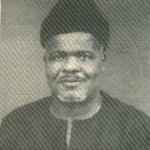Solomana Kanté
In the beginning …
Solomana Kante was born 1922 in Soumankoi village near the city of Kankan in the Republic of Guinea, West Africa. He died in Conakry, the Capital of the Guinea, November 23, 1987. His father’s name was Amara Kante and his mother Maiden name was Diaka Keita.
Solomana’s father owned a religious school that had around 300 students. The students came from many cultural backgrounds, and from all parts of Africa. The school was a self supported institution. In the definition of that time, that meant that the school charged no tuition, and received no help from the colonial French government. The support came mainly from the family of the teachers, and the efforts of the older students. In those colonial time only French schools, religious or otherwise could receive government assistance.
After the death of his father, Solomana’s older brother Amadou Kante, who was not interested in teaching, decided not to stay with the school. Solomana, 19 years old at the time could not convince the older students to stay, and continue the work of his father. Consequently The school was disbanded. Solomana decide to seek his fortune elsewhere.
The Journey…
His father’s death in 1941 marked a turning point in the life of young Solomana Kante.
In 1944 he went to Bouake, a city in Cote d’Ivoire as a merchant of cola nuts. Cola nut at the time was a lucrative business. At the time the richest Mandens were among the cola nut merchants. That was because cola nut for the Mandens was and remains an important ceremonial gift. Even today it is the primary, and the only required dowry in Manden marriage. Although he was engage in commerce, he continued his religious studies.
One day he read an article from a Lebanese journalist who was writing about the struggle of the Lebanese merchants in west Africa. In his introduction of the article the journalist described life in general in West Africa. He described life, culture, languages, customs, and religions of the West Africans.
In his analysis of the African languages he concluded that there were many languages, and dialects in West Africa and none was writing. He said that with few exceptions like the Vai writing in Liberia, the black Africans were not interested in writing their languages.
It was then like many great men and women of the past and present, that Solomana begin to ask the big question, why not.
After agonizing for a long time on this question, he decided to write in his native language, Mandenkan (Kan means Language). First he attempted to use Arabic letters, and later the Latin alphabet to write the language, as it was tried by many others before him to write African languages. Unfortunately none of those systems could satisfactorily capture the intricacies and the phonetics of Manden language.
He then decided that he will have to create a new writing system in order to account for all the differences of the Manden language. He completed his scripts April 14, 1947 in Bingerville, Republic of Cote d’Ivoire, and called the writing system, N’Ko (okz).
N’Ko (also known as “The Clear Language”) is the language of all the Manden people. The phrase “N’Ko speakers” is used as the global reference to all the people who speak the different branches of the language. This group includes Maninka, Bamanan, Dioula, Mandenko, Mandingo, Konia, Vai, Mende, Kono, etc. Even Soundiata, the emperor of the Manden Empire (Mali Empire) addressed the people present at his coronation, and the negotiation of the Constitution the empire “Kurukanfua Charter” as “N’Ko Speakers”.
It should be noted also that it was not just for the basic need to create a writing language for his people that committed himself to this goal. But, he also believed that it was much easier to be educated in ones own language than in a foreign one. Furthermore, it would be much easier to increase the level of education of the Mandens, an all Africans in general with a written African language then a foreign one.
The Return …
After few years in Cote d’Ivoire He returned to Guinea to teach and write. He taught hundreds of students, and published well over 70 books in N’Ko. These books covered all aspects of Manden life including society, economy, history, and science. Today the fire of N’Ko is burning in the savannas, the deserts, and the mountains of West Africa, and anywhere in the world Mandens are found.
More and more, and day to day transactions including business transactions are done using N’Ko instead of other official languages. The Bible and Koran have been translated into N’Ko. Graduate students, and educators come from all over the world to west Africa to learn the language. Various N’Ko symposiums are conducted throughout the region, and throughout the years. In a very near future N’Ko will become the predominant form of writing in West Africa.
For his accomplishment the world owes Solomana Kante (The Teacher) indeed a debt of gratitude.
Mamady Doumbouya
President N’Ko Institute


